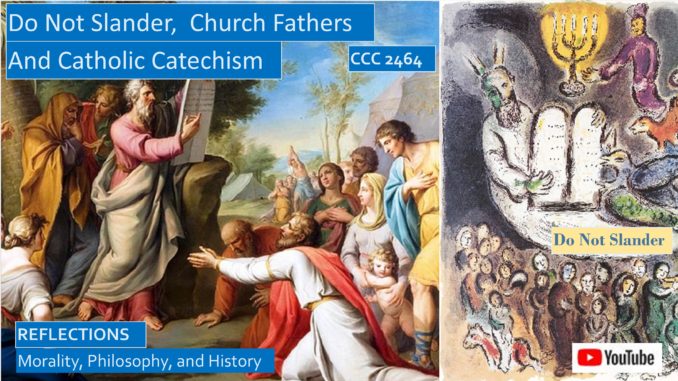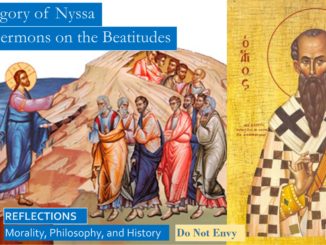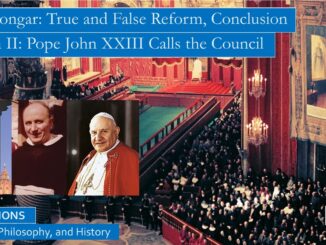
The Eight Commandment in the Catholic catechetical tradition exhorts, “You shall not bear false witness against your neighbor.” Many people shorten this commandment to, You shall not lie, and although lying is usually sinful, this is a shallow understanding of this commandment.
YouTube Video for this blog: https://youtu.be/CZADtl6Yz74
YouTube script with book links: https://www.slideshare.net/BruceStrom1/do-not-slander-church-fathers-preachers-and-catholic-catechism-ccc-2464
The short summary of this commandment in the Catholic Catechism is very carefully worded. The Catechism teaches us, “The eighth commandment forbids misrepresenting the truth in our relations with others.”
When we say something truthful yet hurtful about our neighbor, we show we do not love our neighbor, we show we delight in shredding his reputation.
The Catechism continues, “This moral prescription flows from the vocation of the holy people to bear witness to their God who is the truth and wills the truth.”
How we treat our neighbor bears witness to the world on whether we are truly Christian.
The Catechism continues, “Offenses against the truth express by word or deed a refusal to commit oneself to moral uprightness: they are fundamental infidelities to God and, in this sense, they undermine the foundations of the covenant.”
God is love, God is truth, God is kind, we deeply offend God when we harm our neighbor by damaging his reputation.[1]
Why does this commandment not say, Thou shalt not Lie, or Thou Shalt Not Slander, but rather forbids that We Shalt Not Bear False Witness Against Our Neighbor? Is this commandment more concerned with our testimony in court than what is our motivations, our intent? What is true is that there was no forensic science in the ancient world, eyewitness testimony was often the only evidence, sometimes the only permissible evidence, there were few rules restricting frivolous lawsuits, which meant that perjury was indeed a serious offense.
Brevard Childs in his commentary on Exodus translates this commandment as “You shall not testify against your neighbor as a lying witness,” which is similar to the NIV translation, “You shall not give false testimony against your neighbor.” Childs notes that “Deuteronomy 19:19 specifies that if a witness is proven false, ‘you shall do to him as he had intended to do to his brother. Likewise, the Code of Hammurabi specifies that in capital cases the false witness should be put to death.”[2]
Both in ancient and modern times this commandment also applies to private conversations and gossiping, and stated positively, bids us to protect our neighbor’s reputation. The Church Fathers focus on our love for our neighbor when contemplating this commandment. St Gregory Palamas in our English translation renders the commandment as, “You shall not accuse anyone falsely.” We are warned that if we accuse anyone falsely, we may “become like the devil, who falsely accused God to Eve and was cursed by God. Rather, we should conceal our neighbor’s offense, unless by so doing others may be injured; and in this way we will imitate not Ham, but Shem and Japeth, and so like them receive the blessing.”[3]
The story of Ham, the son of Noah, and the covering of Noah by his brothers Shem and Japheth, after the Ark had landed in the New World, the world newly created, when Noah was overcome by despair and drink, is a favorite of the rabbis, you can our blog on the Torah for this story. The poetry of Genesis tells us this story the best:
“Noah began to be a man of the soil
And he planted a vineyard.
He drank of the wine and was intoxicated.
He then uncovered himself in the tent.
Ham the father of Canaan saw
The nakedness of his father,
And told it to his brothers who were outside.
Shem and Japeth took the cloak,
Placed it on their shoulders,
And walked backwards,
Covering the nakedness of their father.
They faced away from him,
And did not see the nakedness of their father.
Noah awoke from his wine
And he realized what had been done to him
By his youngest son.
He said, “Cursed is Canaan.
A slave of slaves shall he be to his brothers.”[4]
Perhaps the prohibition against slandering, or bearing false witness, is also referred to in the Mitzvah forbidding us to build a roof on a house without a parapet, or fence on your roof. People in ancient Israel often slept on the roof in the summer to keep cool, and if you did not build a parapet on the roof you could roll off and die when you fall several stories.
Negative Mitzvah 298.
When you build a new home,
You are to make a fence for your roof;
And do not place blood liability in your house,
For someone who should fall
May fall from it.
Deuteronomy 22:8-9
The Decalogue has a progression both among the commandments that exhort us to Love God with all of our heart and with all of our soul and with all of our strength and with all of our mind, and those that exhort us to love our neighbor as ourselves. The progression is we must think holy thoughts, so the words we speak are holy, so our actions are holy and righteous.
Ilias the Presbyter teaches us that “a person may have sullied his soul with words even if he has not degraded it by actions; and he may still be impure in his thoughts even if he watches over his words. For these are three different ways of sinning.”[5]
St Maximus warns us, “Do not listen gleefully to gossip at your neighbor’s expense or chatter to a person who likes finding fault. Otherwise, you will fall away from divine love and find yourself cut off from eternal life.”[6]
St Thalassios links our thoughts about God to those of our neighbor:
“The intellect energized by divine love cultivates good thoughts about God, but when impelled by self-love it produces diabolical thoughts.
When the intellect is moved by love for its neighbor, it always thinks well of him, but when under diabolical influence it entertains evil thoughts about him.”[7]
The Oscar ceremonies at the 94th Academy Award recently, when we were working on this video, provided an excellent object lesson on the spiritual dangers of slander and lying, and how often these are preceded by joking.
We are not justifying Will Smith’s decision to slap Chris Rock when his joke offended Jada Smith, Will Smith’s wife, and we also concur with those who feel that this act of violence, which could have possibly led to a criminal assault charge, is a greater offense than Chris Rock’s joke.
https://en.wikipedia.org/wiki/Will_Smith%E2%80%93Chris_Rock_slapping_incident
But this incident does illustrate the spiritual dangers of joking, especially jokes that belittle our neighbor, especially jokes about our neighbor’s race, gender, weight or ailment, all of which are either impossible or very difficult to change. We know that monastic manuals such as the Ladder of Divine Ascent lay down strict rules that can be tempered by laymen, but everyone should be very cautious about what jokes they tell, especially jokes that laugh at our neighbor. Perhaps Christians should be reluctant to become comedians.
St John Climacus in the Ladder of Divine Ascent teaches us that the liar commits a most serious sin, “a lie is the destruction of love,” you must be careful what you say, what you hear, you should be especially careful lest your joking chatting crosses over into gossip and slander. Laughs and jokes should never be at the expense of your neighbor’s reputation and the salvation of your soul. Why do we lie and slander? “Some lie for sheet wantonness, some for amusement, some to make bystanders laugh, some seek to trap their brother and injure him.” “Hypocrisy is the mother of lying, and often its occasion.”
St John Climacus teaches that there is great spiritual danger in lying for any reason, even when we twist the truth to avoid hurting our neighbor, or even to save his reputation. “When we are completely cleansed of lying, then we can resort to (exaggeration), but only with fear and as occasion demands.”[8] We discuss this in greater depth in our blog on Dr Laura and her rabbi’s book on the Decalogue. We should always be very reluctant to exaggerate and twist the truth, only telling white lies when the truth would harm our neighbor, and we should never slander, as slandering is always done with malicious intent.
The Church Fathers in “Unseen Warfare” teach us how giving careful attention to how we speak is the key to avoiding gossip and slander that slips out. We think we know more than we do, we grow too fond to the sound of our voice. We are warned, “You should only speak of yourself and your accomplishments only when compelled to do so, and then you should be as brief and modest as possible.”[9] “Good feelings are silent. Those feelings that seek expression in words are most egotistical,” feeding our self-love, always justifying our faults, putting us in the best light. “Loquacity, endless talking, mostly comes from vainglory,” wants to make us the expert in whatever we babble about.
Such loose talk is spiritually dangerous, “empty talk is the door to criticism and slander, the spreader of false rumors and opinions, the sower of discord and strife.” Empty talk stifles our intelligence and tries to hide our ignorance. “When wordy talk is over, and the fog of self-complacency lifts, it always leaves behind a sense of frustration and indolence. Does this not prove that, even involuntarily, the soul feels it has been robbed?”
How should we speak? The Church Fathers in “Unseen Warfare” advise us not to speak about topics we are not sure of, particularly if we could harm someone if we express our opinion, or if “we confuse the simple hearts of listeners.” Listen carefully, speak less. Always, when “speaking or listening, raise the eye of your mind on high where your God is, thinking of His greatness and remembering that He never loses sight of you and look at you either with approval or disapproval, according to what is in the thoughts of your heart, in your words, movements, and action.”
“Silence is a great power in our unseen warfare and a sure hope of gaining victory. Silence is preferred by he who does not rely on himself but trusts in God alone. Silence is the guardian of holy prayer and a miraculous helper in the practice of virtue; it is also a sign of spiritual wisdom.”[10]
DL Moody pairs this command with the commandment not to take the Lord’s Name in vain, language is what distinguishes us from the beasts, language is what binds our social fabric, our “words must command confidence.” Slander is murder by the tongue, slanderers are like flies that settle on a man’s sores, ignoring all that is good and noble about him. Slanders are like the burning tails of Solomon’s foxes that burn up whole field of wheat in the world up in flame. DL Moody relates a story of gossip who confessed her sins to a priest, as a penance he gave her a thistle, and asked her to scatter the seeds one by one. She was puzzled by this, but did as he asked, but when she returned the priest asked her to gather the seeds back up. Such is the nature of slander, slanders scattered can never be gathered back up and forgotten.[11]
[1] http://ccc.usccb.org/flipbooks/catechism/index.html#590 , paragraph 2464.
[2] Brevard Childs, “The Book of Exodus,” (Philadelphia: The Westminster Press, 197), pp. 424-425.
[3] St Gregory Palamas, “A New Testament Decalogue,” In the Philokalia, The Complete Text, compiled by St Nikodimos of the Holy Mountain and St Makarios of Corinth, Vol. 3, translated and edited by GEH Palmer, Phillip Sherrard, and Kallistos Ware (London: Faber and Faber, 1981), pp. 329-330, #9.
[4] https://www.biblegateway.com/passage/?search=genesis+9%3A20-25&version=NRSVCE
[5] Ilias the Presbyter, “Gnomic Anthology 1,” In the Philokalia, The Complete Text, compiled by St Nikodimos of the Holy Mountain and St Makarios of Corinth, Vol. 3, translated and edited by GEH Palmer, Phillip Sherrard, and Kallistos Ware (London: Faber and Faber, 1981),
[6] St Maximus, “First Century on Love,” In the Philokalia, The Complete Text, compiled by St Nikodimos of the Holy Mountain and St Makarios of Corinth, Vol. 2, translated and edited by GEH Palmer, Phillip Sherrard, and Kallistos Ware (London: Faber and Faber, 1981), p 59, #58.
[7] St Thalassios, “Third Century on Love, Self-Control and Life in accordance with the Intellect,” In the Philokalia, The Complete Text, compiled by St Nikodimos of the Holy Mountain and St Makarios of Corinth, Vol. 2, translated and edited by GEH Palmer, Phillip Sherrard, and Kallistos Ware (London: Faber and Faber, 1981), p. 323, #79-80.
[8] St John Climacus, “The Ladder of Divine Ascent,” translated by Lazarus Moore, updated by others (Boston:Holy Transfiguration Monastery, 1991), pp. 93-95.
[9] Dom Lorenzo Scupoli, “The Spiritual Combat,” translation revised by William Lester and Robert Mohan (Maryland: St Benedict Press, TAN Books, 2010, 1945), pp. 79-80.
[10] Dom Lorenzo Scupoli, “Unseen Warfare, The Spiritual Combat,” edited by Nicodemus of the Holy Mountain and revised by Theophan the Recluse, translated by E Kadloubovsky and GEH Palmer (New York: St Vladimir’s Press, originally 1904) pp. 143-147.
[11] DL Moody, “Weighed and Wanting, Addresses on the Ten Commandments,” (New York: Fleming Revel Company, 1898), pp. 54-57.




Be the first to comment